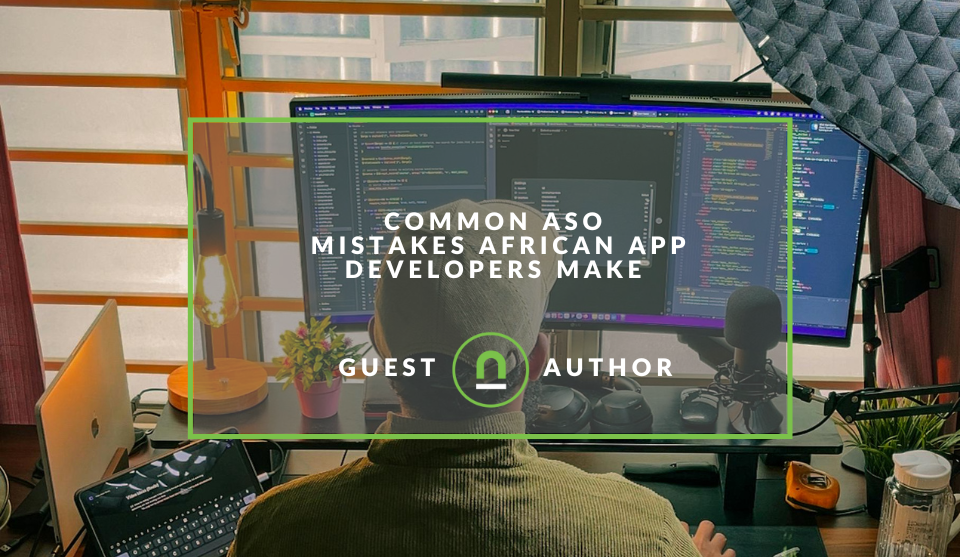Recent posts

Press Releases
Africaworks Accelerates The Rollout Of Real Estate Investment Platform
20 January 2026

Press Releases
80% of Gen-Zers Would Marry an AI
19 January 2026

Press Releases
The Rise of AI Computing Power Assets
16 January 2026

Industry Experts
Common ASO Mistakes African App Developers Make
09 January 2026
Popular posts
Extravaganza
Trending Music Hashtags To Get Your Posts Noticed
24 August 2018
Geek Chic
How To Fix iPhone/iPad Only Charging In Certain Positions
05 July 2020
Extravaganza
Trending Wedding Hashtags To Get Your Posts Noticed
18 September 2018
Money Talks
How To Find Coupons & Vouchers Online In South Africa
28 March 2019
How to Become a Software Developer Without a Degree
11 November 2020 | 0 comments | Posted by Mary G. Byrd in Talent Agents
Becoming a software developer is a tempting idea if you consider the rapid growth of the IT market, high demand for the tech talents that will be growing too, decent salaries of these specialists, challenging tasks on the crossroads of technical and creative thinking, plus an opportunity to work from any corner of the planet.
What's more, you don't even need higher education to become a software developer. Considering the great demand and sometimes even lack of tech talents, the only things you need to have are a strong desire and up-to-date knowledge.
So, here is your step by step guide on how to become a software developer without a degree.
Decide on the speciality/Tech stack you want to be proficient in
If you are an absolute newbie in the field of informational technologies and software development, the first thing you should decide on is your future specialisation.
- Do you want to create games?
- Or programming smart contracts sounds better to you?
- Maybe, you want to create business-specific software to help your customer's companies grow?
The choice is up to you; however, you should be very clear about it since it will define the technologies stack you will need to learn.
Start your self-learning path
After you have decided on the previous point, it's time to start your self-learning and self-development path. Fortunately, there are a lot of educational materials freely available online, plus there are active communities around every popular technology so you can always ask a question on GitHub or a specific forum. So, depending on the technology you choose, start your searches for books, training, online courses, tech blogs, and other educational materials.
We kindly advise starting your tech education with software development courses on Udemy and Coursera. On these platforms, any topic is presented in a very comprehensible manner, so even a newbie will be able to cope. After you get your first fundamental knowledge, continue to dig deeper by asking yourself specific questions and finding answers to them. Come up with Some Personal Projects
The theory is great, but it is practically worthless without practice. It's time to test your level of knowledge and show what you can create from the technology you have learned. To do this, you need to create several personal projects.
First, they will be the first foundation of your future resume and portfolio, which we will talk about later in this article. Secondly, this is the surest way to understand how the technology you learned works and how you will use your new knowledge and skills.
The list of personal projects that you can create is quite large. For example, it could be an e-commerce site, a data model, a chatbot, a simple listing application, and so on. Choose the task within your capabilities, but still try to challenge yourself.
Leverage your professional social media presence
The next step is developing your social profiles and networking. LinkedIn is the best social network that allows you to achieve both goals at the same time - create your specialist profile, plus reach out to HR managers and business owners who may benefit from your services.
Therefore, if you have not done so yet, start creating a profile on LinkedIn. Take a look at the Bio section and write a few words about you and the job you would like to take on next. Also, indicate that you are actively looking for a job in the profile header.
Prompt! It will also be useful to subscribe to thematic groups and profiles on Instagram and Facebook to keep abreast of news and open vacancies. Prepare Your Resume and Draft a Cover Letter
Well, our ultimate goal is getting a job, and getting a job is impossible without a cover letter and resume. What is more, you don't need to spend a lot of time creating these documents.
Instead of creating your resume manually, you can use the resume and cover letter builders. All you need to do is indicate your skills and competencies, and add a touch of customisation. Also, do not forget to add your personal projects, knowledge of foreign languages, as well as courses that you have successfully completed.
Consider internships/freelancing opportunities
Looking for your first job in the field of software development can be challenging; however, there are two ways to go.
- Firstly, you may consider internship opportunities. A lot of companies are in search of young talents, and that is why they free up some places for the best beginning programmers to teach them. What's more, there are tons of remote internship jobs you may apply for so you shouldn't limit your choices to your location only.
- Secondly, consider freelancing as a way to get the first experience, earn the first money, and get more projects to mention in your resume and portfolio. Start by registering on Upwork and bid on the orders you may cope within your schedule.
One more tip! If you want to get even more valuable experience, consider participation in startup development. As a rule, startup projects have limited budgets, so most likely, your earning will be quite honest; however, it will be a real project you may show off.
Start reaching out to the potential employees
After you got your first experience during your internship, freelancing, creating your personal or startup project, it's time to look for the perfect software development company for you. Use the leading job portals that have a flexible filter system for vacancies, and submit your resume for openings that seem appropriate. Don't forget to add a cover letter to get more attention.
Prompt! You can also contact recruiting agencies and ask them to add your resume to their database.
Conclusion
Becoming a software developer without a degree is not as difficult as it may seem. Yes, there is some competition; however, the desire to learn, develop, and follow innovative practices can give you the best chance of getting your dream job. What's more, a lot of positions are open remotely now, so you have the widest possible list of opportunities to choose from as a developer!
Tell us your story
Would you like to write for nichemarket just like Mary has? Find out how to submit a guest post and when you're ready, you can contact us.
Are you looking to promote your business?
South African digital businesses can create your free business listing on nichemarket. The more information you provide about your business, the easier it will be for your customers to find you online.
Registering with nichemarket is easy; all you will need to do is head over to our sign up form and follow the instructions. If you require a more detailed guide on how to create your profile or your listing, then we highly recommend you check out the following articles.
Recommended reading
If you enjoyed this post and have time to spare why not check out these related posts and dive deeper down the rabbit hole that is web development.
You might also like
Common ASO Mistakes African App Developers Make
09 January 2026
Posted by Daniel Davis in Industry Experts
ASO is Localisation, Not Translation: Failing to research specific local search terms and cultural nuances is the biggest ASO error in African market...
Read moreThe Rise of AI Computing Power Assets
16 January 2026
Posted by Rehman Ali in Press Releases
An introduction to Cloud mining and monetising cloud computing as DLMining Reshapes Wall Street's New Anti-Inflation Investment Paradigm
Read more{{comment.sUserName}}
{{comment.iDayLastEdit}} day ago
{{comment.iDayLastEdit}} days ago
 {{blogcategory.sCategoryName}}
{{blogcategory.sCategoryName}}
